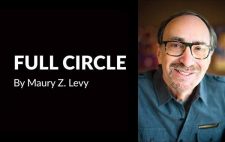In my house, I was the only one who spoke English. My parents? Not so much. When they wanted to say something, but they didn’t want me to understand it, they spoke Yiddish.
Yiddish is the giraffe the committee built. It’s some Hebrew, with a germ of German and a pinch of Polish.
Yiddish was recently in the news when one of the presidential candidates used the word schlong and said it meant beaten. Not even close.
And so, with many more months left in the race, I thought a quick course in Yiddish might be in order. It’s a very confusing language, Yiddish. Many words sound the same. So, here’s your official guide. This is Yiddish 101. For you, Yiddish 99.
The two words that most people know, from years of listening to the “Laverne and Shirley” theme song, are schlemiel and schlimazel.
The difference? A schlemiel is a klutz, someone who’s clueless. A schlimazel is a guy who is just loaded with bad luck. So, a shlemiel is the guy who walks into a tree and scares a big bird. The schlimazel is the guy the bird poops on.
Now, a klutz is someone awkward who stumbles a lot. A kvetch is someone who always complains because the klutz stumbles into him.
Want more? Bubbala is a term of endearment. “Come here, bubbala, let me give you a hug.” But bupkes means worthless. “I worked all month on this column, and you know what I got, bubbala – bupkes!”
Ferblunjit means confused, mixed up. Ferdrayt means dizzy and confused. Fercockt means screwed up. Fermisht means all shook up. So, the ferblujit blonde went to the car without her keys. She was so ferdrayt, she didn’t know where to look. She asked her fercockt husband to borrow his. But his car was keyless. So now, she was fermisht. Fershtay? Oh, fershtay means do you understand. Just say yes and move on.
A megillah is a big production. The gorilla at the zoo put his hands through bars and scraped Myron’s fingers. Myron insisted on complaining to the owner of the zoo, and proceeded to make a gorilla megillah.
OK, now meshugge means crazy. He went meshugge when I gave him the check. And someone who goes meshugge is a meshuggina. Don’t get meshugge, you meshuggina.
A nebbish is someone who just doesn’t measure up. A loser. A nudnik is an annoying pest. The nebbish was afraid to tell his wife she was a nudnik.
A schmendrick is a small schlemiel. A pipsqueak. A shmegegge is someone who’s just plain petty. A shmegegge will always pick on a schmendrick. Unless there’s a shnorrer around. A shnorrer is a moocher, a chiseler. Minnie was a shnorrer. Her husband was a schmendrick. Together, they made shmegegge babies.
Great, you have mastered some basic Yiddish words. You are now ready to move on to insults.
“Lign in drerd un bakn beygl!” is an insult that means “May you lie in the ground and bake bagels.” So says the book “Born to Kvetch.” It’s really a curse that means you should burn in hell for all eternity and bake bagels that you may never eat.
Now, lock in kop means a hole in the head. If there’s something you don’t want, you would say, “I need to read this column like a lock in kop.” As you see, there is a distinct difference between hole in the bagel and hole in the head. One has raisins.
It’s a loving language, Yiddish. Always concerned with people’s feelings. A pisher is what you’d call an inexperienced person. Literally, it means bed-wetter.
Once you’ve been called that, you might plotz. Plotz means to explode with anger. You would tell someone who just heard bad news not to plotz. Don’t have a heart attack. And plotz is something you don’t want to do. Or you’ll end up in a cemetery plot. Got it? Mazel tov!








